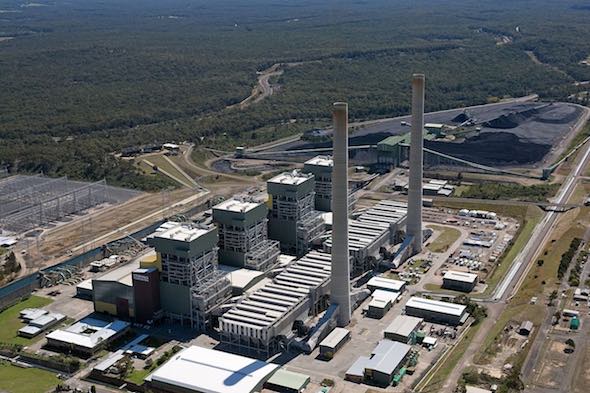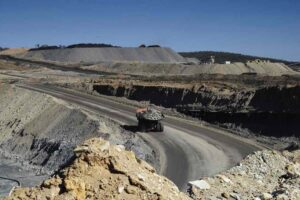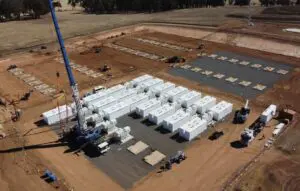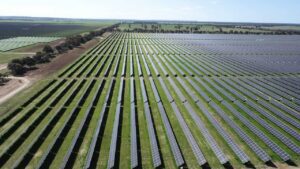Origin Energy sees a recovery in gas prices lifting earnings from its energy supply business by as much as much as 78 per cent this year, underscoring its reliance on fossil fuels while still pledging a transition to clean energy.
In guidance issued on Wednesday, Origin advised that underlying earnings before interest, tax, depreciation and amortisation for the energy markets business should increase to between $500 million and $650 million this financial year, up from $365 million last year – a jump of between 37 per cent and 78 per cent.
And if there was ever any doubts about Origin Energy’s long-term reliance on gas production, remarks by CEO Frank Calabria at the company’s annual shareholders meeting removed them.
Despite assuring shareholders that Origin was developing a suite of future energy customer offerings, including green hydrogen and ammonia and carbon management solutions and reiterating decisions to exit the Beetaloo Basin, and bring forward closure of the Eraring coal-fired power station, the reliance on gas was key.
“Gas will remain important to ensuring reliability of the energy system for many years because gas peaking plants will underpin reliable energy supply as the penetration of variable renewable energy sources increases,” Calabria said.
“Gas is also still a major source of energy for heating homes in colder parts of Australia and critical for manufacturing, where a viable alternative isn’t yet available. We will continue to run a leading gas business that is competitive and focused on decarbonisation.”
It’s also worth noting that Origin revealed it has contracted 4.4 million tonnes of coal for the coming year, and expects to reach its target of 5 million to 6 million tonnes by the end of the year. The nature of those contracts will also heavily influence the size of its profits.
It’s also worth noting that Origin revealed it has contracted 4.4 million tonnes of coal for the coming year, and expects to reach its target of 5 million to 6 million tonnes by the end of the year. The nature of those contracts will also heavily influence the size of its profits.
Origin’s “Say on Climate” vote during the meeting saw 94 per cent of shareholders supporting the company’s Climate Transition Action Plan (CTAP).
The plan underscores medium-term targets to reduce emissions intensity by 40 per cent and achieve a 20 million tonne reduction in absolute carbon emissions, by 2030, against 2019 baseline.
Shareholder endorsement of the plan, the credibility of which was significantly enhanced after Origin announced an exit from gas exploration in the Beetaloo, Canning and Cooper-Eromanga basins earlier this year, received modest praise from some environmentalist groups.
Alex Hillman, lead analyst at the Australasian Centre for Corporate Responsibility (ACCR) noted that while divesting exploration acreage moves emissions off Origin’s balance sheet, it may not prevent these emissions from being released.
“In fact if Origin divests to a junior explorer, this could simply turbocharge the developments,” Hillman said.
ACCR had filed a shareholder resolution with Origin that sought the inclusion of a climate sensitivity analysis in the notes to the company’s financial statements.
Origin subsequently committed to doing this starting in the current financial year, leading the ACCR to withdraw the proposal.
“Origin’s commitment to disclose the impacts of a 1.5C climate sensitivity from next year acknowledges that climate risk is financial risk,” Hillman said. “We expect all fossil fuel companies to rigorously disclose climate risk in their financial statements and welcome Origin’s leadership in this space.”
CTAP serves as a guide for Origin’s long-term ambition to reach net zero carbon emissions across scope 1, 2 and 3 emissions by 2050. It includes medium-term targets to reduce emissions intensity by 40 per cent and achieve a 20 million tonne reduction in absolute carbon emissions, by 2030, against 2019 baseline.
Origin Energy in May received planning approval from the NSW government for the 2,800MWh big battery that will at least partially replace the giant Eraring power station it plans to close in 2025. It also plans to build or contract 4GW of new wind and solar by 2030.
Origin is fast-tracking the closure of Eraring because it no longer sees a long term business case for so-called “baseload” assets as the amount of renewables, and rooftop solar in particular, grows its share of the market.










